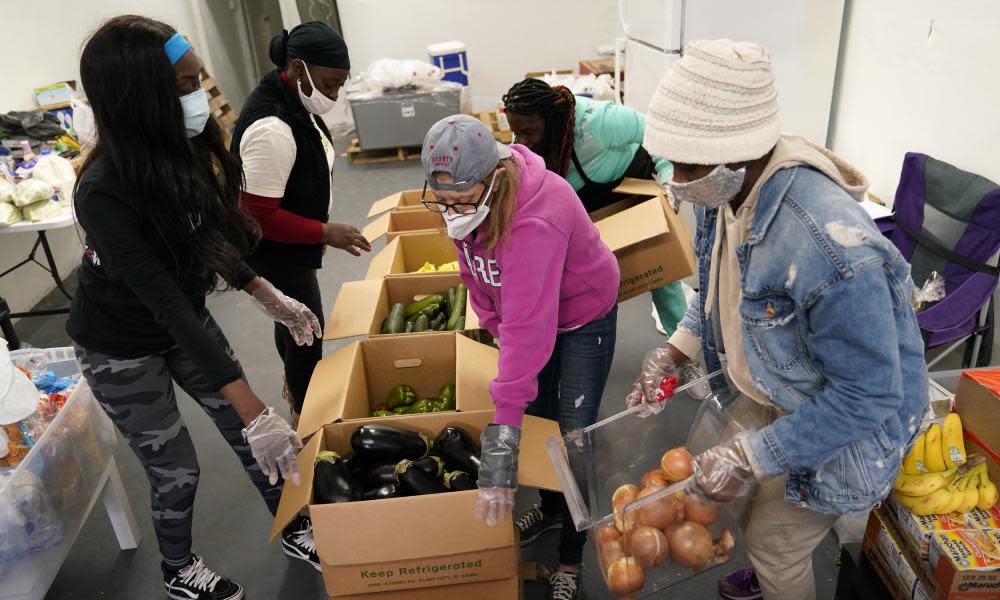‘Health insurance or food’: Americans face difficult choices amid pandemic

Throughout the United States, Americans with chronic illnesses have been forced to navigate a healthcare system battered by the coronavirus pandemic while trying to afford medical treatment and resolve health insurance issues.
That has led to many Americans making difficult decisions about delaying vital care, or sacrificing other basic necessities – such as transport costs or food – in order to pay for health insurance so that they can get the treatment they need.
Quana Madison, a disabled artist in Denver, Colorado, has struggled with high medical costs for several years while fighting breast cancer that included requiring a double mastectomy, several other illnesses, chronic pain issues, and complications from surgeries.
She filed for bankruptcy due to debt from medical bills in 2017, even as she had private health insurance at the time.
During the coronavirus pandemic, Madison has continued facing health issues and recently undergone breast reconstruction surgery and biopsies. Due to her reported income being too high one month to remain eligible for Medicaid coverage, she is currently trying to appeal against a decision to kick her off Medicaid coverage at the end of January 2021.
“My income as an artist fluctuates dramatically every month,” said Madison, who lost a significant amount of work and contracts due to the pandemic. “After January who knows if I will have insurance.”
Through the Affordable Care Act marketplace, Madison wouldn’t be able to keep her doctors or medical specialists because they wouldn’t be covered by any of the plans, and on the private marketplace she can’t find any coverage due to pre-existing conditions, though no options are affordable with her income which fluctuates based on art sales and what commission based work she is able to obtain.
Out of pocket, her medical care every year would cost tens of thousands of dollars.
“It’s overwhelming worrying how I will afford paying for health insurance. I wonder, do I pay for health insurance or food this month?” added Madison.
Madison is far from alone.
A November 2020 survey conducted by the patient financial management company VisitPay found 35% of Americans would delay care for coronavirus out of fear for associated medical bills. Though the federal government is supposed to cover any coronavirus-related medical bills for the uninsured, many coronavirus patients and families of coronavirus victims have received medical bills anyways.
Claire Chadwick, who works for a big box retailer in the Kansas City, Missouri, area, was diagnosed with coronavirus in March 2020 and has since experienced long-term side-effects, such as fatigue and rapid heart rate while at rest.
Despite her Covid-related medical issues, Chadwick works as many hours as possible to try to pay off hundreds of dollars in medical bills she accrued from doctor visits and medications, even as she is covered under her employer’s health insurance program.
“I worry about reinfection and the stress of working during the pandemic is difficult to handle,” said Chadwick. “I am working my ass off so that I can pay down on these medical bills. A couple months ago, when I was really struggling, I couldn’t work as many hours and had a lot of medical bills that still needed to be paid, the electric company came to shut off my electricity,”
She was forced to sign up for a payment plan to avoid having her electricity shut off, which is rolled into her monthly utility bills, and if she is one day late with the payment plan, Chadwick will owe everything at once and have her utilities shut off until it’s paid in full.
Though the health insured rate in the US has yet to show any significant changes so far, according to a recent analysis by the Kaiser Family Foundation, an estimated 2 to 3 million Americans lost their employer-based health insurance coverage between March and September.
Prolonged job losses are expected to increase the numbers of Americans to lose health insurance during the pandemic, leaving tens of millions of Americans uninsured or underinsured through the worst pandemic to hit the US in over 100 years.
Daniel Oxford of Las Vegas, Nevada, has been fighting colon cancer since he was first diagnosed in March 2018. He recently lost his health insurance through Medicaid due to a clerical error he is working to resolve before his next doctor appointment in February 2021.
When the coronavirus pandemic hit, he temporarily lost his job in cosmetics, and has relied on support from friends and family to cover expenses for medical supplies, bills and food.
“I need these medical supplies to live. It isn’t fair that I have to choose between buying groceries or medical supplies,” said Oxford. “I plan on going back to work soon, I’m just trying to get as healthy as possible, but I’m nervous to go back with such a bad immune system. Working with people and coronavirus going around like crazy, especially in a tourist city like Las Vegas, I’m not excited.”
Amy Nicole Fisher, 38, of Des Moines, Iowa, is disabled and suffers from an autoimmune disease. During the pandemic, Fisher, who is at high risk for coronavirus, explained she has been the sickest she has ever been, and has often avoided going to the hospital or seeking medical care for fear of the costs and the risks of exposure to coronavirus.
“I would likely not survive Covid-19, but honestly part of me thinks if I did get it, I wouldn’t be such a financial and just burden in general on my family,” said Fisher. can’
Though she has Medicare and a health insurance supplement through her husband’s employer, Fisher and her family face thousands of dollars in co-pays and medical bills every year. In past years, they lost a condo and a rental home due to surmounting medical bills.
“We just add it to our credit cards because we live paycheck to paycheck,” Fisher added.

